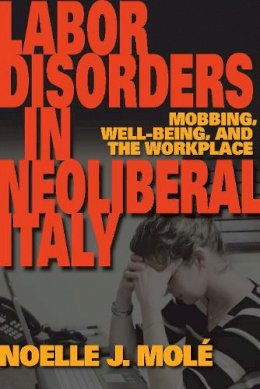Noelle J. Molé is a political and medical anthropologist. She teaches in the Expository Writing Program at New York University.
Molé's exploration of mobbing in Italy is both informative and insightful. She offers readers in the United States insight into an entirely different way of interpreting many of the detrimental workplace changes that they, too, have experienced. (American Journal of Sociology) This detailed and critical ethnography of neoliberalizing processes . . . will be of deep interest to scholars of labor and gender, the state, neoliberalism, and medical anthropology. (Anthropology of Work) Recommended. Labor studies collections at graduate and research levels. (Choice) Molé's book is an ethnographically sound and theoretically sophisticated contribution to the understanding of how neoliberal policies are experienced and embodied in Southern Europe, and also of how such policies are conceptualized in medical and legal terms. As such, it is recommended for those interested in the anthropology of Italy, for medical and legal anthropologists, and for students of labor relations. (American Ethnologist) What does neoliberalism feel like? . . . Anyone interested in the social life of the precariat . . . should read Noelle Molé's Labor Disorders. This superb ethnography astonishes on many fronts and is a unique contribution to our understanding of what it means to live and breathe under a hyper-flexibilized labor regime. (Council for European Studies) Labor Disorders is essential research for anyone interested in what happens to worker subjectivities under the neoliberal hegemony. (Work, Employment, and Society) [A] rich case study of the articulation between the state, global capitalism, and the medicalized body. . . .The study is topically relevant, theoretically sophisticated, and methodologically sound.Sept. 2014 (MEDICAL ANTHROPOLOGICAL Quarterly) In an admirably rigorous and thoughtful ethnography, Noelle J. Molé unpacks the crisis and contradictions of workplace mobbing in Italy. . . . Molé has not only impressively detailed a phenomenon of the Italian workplace, she has also elucidated many fascinating aspects of Italian society without resorting to stereotypes or misrepresentations, which has been noted as a problem in Mediterranean studies of the past. (Contemporary Sociology)

